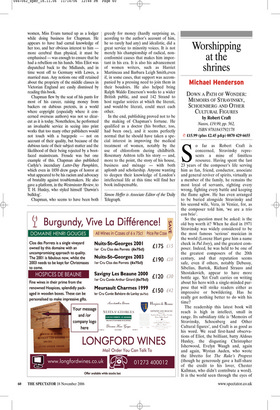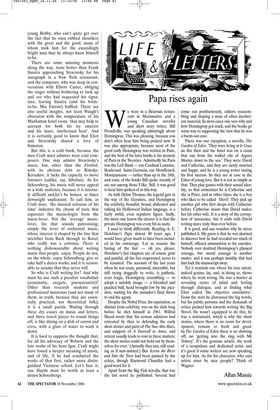Worshipping at the shrines
Michael Henderson
DOWN A PATH OF WONDER: MEMOIRS OF STRAVINSKY, SCHOENBERG AND OTHER CULTURAL FIGURES by Robert Craft Naxos, £19.99, pp. 562, ISBN 9781843792178 ✆ £15.99 (plus £2.45 p&p) 0870 429 6655 So far as Robert Craft is concerned, Stravinsky represents a mine of limitless resource. Having spent the last 23 years of the composer’s life serving him as fan, friend, conductor, associate and general reviver of spirits, virtually as a member of the family, he remains the most loyal of servants, righting every wrong, fighting every battle and keeping the flame aglow. He has even arranged to be buried alongside Stravinsky and his second wife, Vera, in Venice, for, as the composer told him, ‘we are a trio con brio’.
So the question must be asked: is the old boy worth it? When he died in 1971 Stravinsky was widely considered to be the most famous ‘serious’ musician in the world (Lorenz Hart gave him a name check in Pal Joey), and the greatest composer. Indeed, he was held to be one of the greatest composers of the 20th century, and that reputation seems safe, even if others, notably Debussy, Sibelius, Bartok, Richard Strauss and Shostakovich, appear to have more bottle age. Yet Craft carries on writing about his hero with a single-minded purpose that will strike readers either as impressive or bewildering. Has he really got nothing better to do with his time?
The readership this latest book will reach is high in intellect, small in range. Its subsidiary title is ‘Memoirs of Stravinsky, Schoenberg and Other Cultural figures’, and Craft is as good as his word. We read first-hand observations of Eliot, the brilliant, batty Aldous Huxley, the disgusting Christopher Isherwood, Evelyn Waugh and, again and again, Wystan Auden, who wrote the libretto for The Rake’s Progress (though he generously gave a half-share of the credit to his lover, Chester Kallman, who didn’t contribute a word). It is the world seen through the eyes of young Bobby, who can’t quite get over the fact that he once rubbed shoulders with the great and the good, many of whom took him for the exceedingly bright man that he always knew himself to be.
There are some amusing moments along the way, none better than Frank Sinatra approaching Stravinsky for his autograph in a New York restaurant, and the composer, who was deep in conversation with Elliott Carter, obliging the singer without bothering to look up and see who had requested his signature, leaving Sinatra (and his brideto-be, Mia Farrow) baffled. There are also useful insights, not least Waugh’s obsession with the temperature of his Manhattan hotel room, ‘that may help to account for both his icy exterior and his inner, intellectual heat’. And it is certainly good to know that Eliot and Stravinsky shared a love of Simenon.
But this is a cold book, because the men Craft most admires were cold composers. One may admire Stravinsky’s music, but, other than the Firebird, with its obvious debt to RimskyKorsakov, it lacks the capacity to move listeners (unlike, say, Sibelius). As for Schoenberg, his music will never appeal to a wide audience, because it is intensely difficult and,let’s be honest, at times downright unpleasant. To call him, as Craft does, ‘the musical colossus of his time’ indicates the chasm of taste that separates the musicologist from the music-lover. Not the ‘average’ musiclover, for that sounds patronising; simply the lover of orchestral music, whose interest is shaped by the line that stretches from Bach through to Ravel, who really was a colossus. There is nothing dishonourable about writing music that people enjoy. People do not, on the whole, enjoy Schoenberg, give or take half a dozen works, and it is reasonable to assume that they never will.
So who is Craft writing for? And why must he use such a peculiar vocabulary (concinnity, exegete, pococurantist)? Other than research students and professional musicians (and not many of them, in truth, because they are essentially practical, not theoretical folk), it is a small parish. Wading through these dry essays on music and letters, and three travel pieces to round things off, is like dining on a dish of carrot and cress, with a glass of water to wash it down.
It is hard to suppress the thought that, for all his advocacy of Webern and the late works of his hero Igor, Craft might have found a deeper meaning of music, and of life, if he had conducted the works of that first, rather more distinguished Viennese school. Let’s face it, one Haydn must be worth at least a dozen Schoenbergs.



































































































 Previous page
Previous page